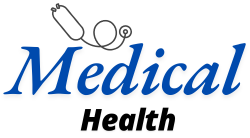Vitamins and minerals, see, they’re not the flashy stars of the show, but they’re the real workhorses, the gears and bolts of your body.
They’re these little organic compounds that your body needs in small, precise doses.
These things, they run everything from your peepers to your immune system, even your energy and bones.
Millions of people, they’re walking around with deficiencies, a fact they don’t even realize.
We’re talking about things your body can’t just whip up on its own, these are not extras these are the bare minimum.
This ain’t about some health fad it’s about how your body works.
You could be eating like a champ, but still, missing some important pieces.
Think of them like tiny, yet strong buddies, each with their own job and if even one of them is out of place, the whole operation is out of whack. It’s like a bad orchestra, and we don’t want that.
Now, there are some main characters in this thing and knowing about each one of them, that is important.
Take Vitamin A, it is not just about carrots, it’s about your eyes, keeping the bad stuff away and keeping your skin in good nick.
Vitamin A, he is the guardian of your peepers, especially when the sun goes down, and it keeps the bad guys out.
Then, you have the B crew, they are the engine of your body, converting grub into energy and keeping the nerves firing. Without them, you are running on fumes.
Vitamin C, she is your shield, great for keeping you healthy and healing wounds, and the collagen she produces, keeps things working well.
Vitamin D, the sunshine guy, he is in charge of your bones, soaking up calcium, he is important for your immune system too, especially if you’re not a sun worshipper.
And Vitamin E, he is the antioxidant heavyweight, keeps your cells safe, and keeps your skin and eyes in good condition.
Lastly, Vitamin K, he is the unsung hero, important for your blood clotting and bones, makes sure the body ticks along just right.
Now let’s get down to minerals, they’re the hard workers, like the concrete in the building, they are what your bones and tissues are made of.
They’re vital for your muscles, nerve signals, and keeping your heart pumping. They come in two groups, macros and traces.
Calcium, he is the most abundant of the bunch, makes up your bones and teeth, an adult needs about 1000-1200mg daily.
Iron, he is the oxygen taxi, keeps the blood flowing and the adult needs about 8-18mg daily, this guy is also important for keeping the energy up and the bad guys at bay.
Magnesium, he is the essential one, responsible for hundreds of reactions, from your muscles, your nerves and keeping the energy up, adult needs 310-420 mg daily.
Potassium, he keeps the fluids balanced, the nerves humming, and the muscles contracting, adult needs 2600-3400mg daily.
Zinc, the immune soldier, also a key player in healing wounds and making DNA, the adult needs about 8-11 mg daily.
And Iodine, he’s the man for your thyroid, which is in charge of growth, metabolism and development, an adult needs about 150mcg daily.
These guys are the basic building blocks, your body needs them to work.
The best way to get what you need, it’s through a balanced diet. A rainbow on your plate.
Apples, oranges, greens, each one with the good stuff the body soaks up.
Whole foods, they are the foundation, the main course for the body.
Fortified foods can help when you are feeling low, especially when you are missing something. But, it’s not a replacement for the real stuff.
Supplements, they can help, but only if you really need them, not instead of eating right.
You also should see a doctor before you take any, it is important.
And, you know, too much of anything can be a bad thing, so you gotta stick to the daily recommendations. Don’t go over the limit.
Spotting deficiencies, they’re not always obvious, but if you keep an eye out you’ll be alright.
They show up as tiredness, feeling weak, bad skin or muscle cramps.
If you are missing vitamins you might have bad vision at night, tired, wounds that won’t heal, and weak bones.
If you are missing minerals, you might get muscle cramps, you are tired all the time, you have an irregular heart beat and your immunity is bad.
If you suspect you have a problem, you have to go see a doctor.
Tests and a diagnosis are important to see what you need, and to make sure you get a personalised plan.
Vitamins and minerals, they change throughout life, you know? When pregnant, your needs are different, when you are a kid they are different, and when you are old they are also different.
When a woman is pregnant, folate, iron, calcium, and vitamin D are extra important, to keep the mom and baby healthy.
When you’re a kid, you need calcium, vitamin D, iron, and zinc, they are the base of a healthy development.
When you get older you need vitamin D, B12, calcium and protein, for your bones, your mind, and your muscles.
Athletes and the active folk, they need more of everything, for energy and muscle repair, think B vitamins, iron, calcium, and magnesium.
Getting the good stuff, it’s not just about what you eat but also about how you absorb it.
You need to eat good fats so you can absorb A, D, E, and K. you need to pair foods, like iron and vitamin C.
Also, you have to be careful how you cook your food, boiling takes the good stuff out, steaming keeps it all in. So be careful how you cook.
This is it, now go out there and get what your body needs.
The Essential Vitamins: A Primer
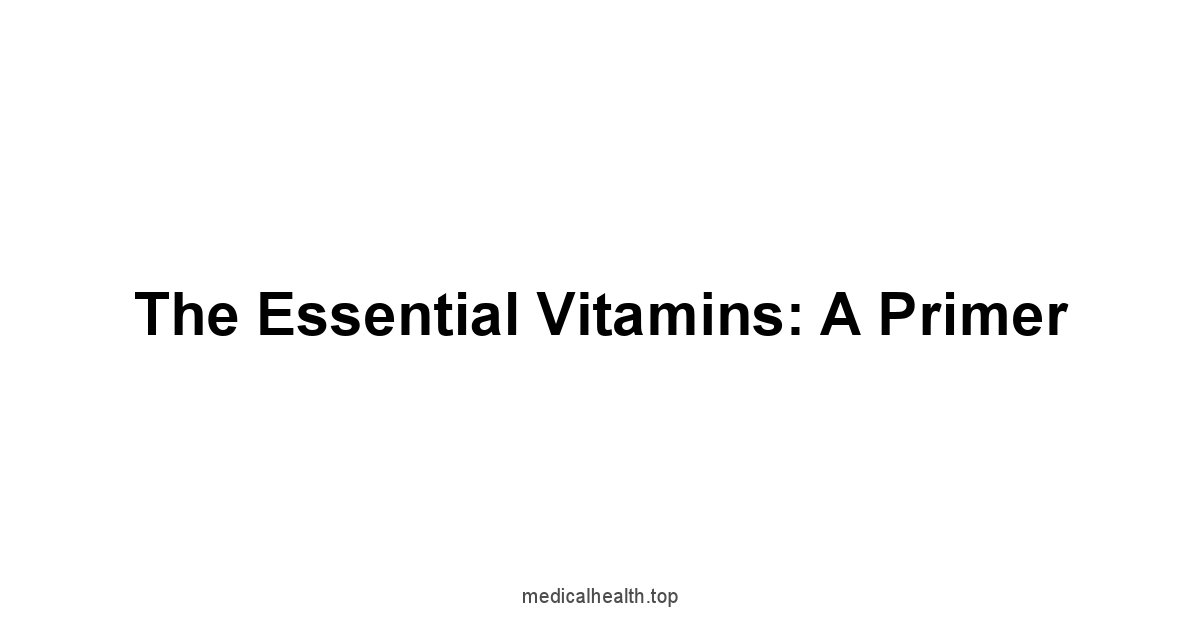
Vitamins, these are the unsung heroes of our bodies.
They’re not the big guns like protein or carbs, but without them, everything falls apart.
Think of them as the tiny gears that keep the whole machine running smoothly.
We need them, can’t make most of them ourselves, and have to get them from our food.
A solid understanding of what they do is the first step in taking care of yourself.
There are different kinds, each with a specific job, and each vital in its own right.
These aren’t just some fancy health fad, these are the real deal.
They are organic compounds that help regulate everything from your vision to your immune system.
They play a part in your energy levels, your bones, and your overall well-being.
It’s a pretty intricate system, and getting the right amount of each vitamin isn’t always as simple as popping a multivitamin.
So let’s break down what these key players do and why they matter.
Vitamin A: Vision and More
Vitamin A, it’s more than just carrots.
It’s essential for good vision, that’s the most well-known fact, particularly in low light.
Without enough Vitamin A you might find yourself struggling when it gets dark.
But it’s not just about seeing in the dark, this vitamin keeps your eyes healthy overall.
It supports the surface of the eye and plays a role in keeping the retina functioning properly.
But that’s just the start, Vitamin A also plays a critical role in cell growth and development and keeps your immune system in top form.
It helps maintain the health of your skin and mucous membranes, the body’s first line of defense against infections. Think of it as a defender of your whole body.
A shortage of Vitamin A, well that can make you more susceptible to sickness and slow down healing.
Getting enough is a must, but not too much, it’s about balance.
- Key Functions: Vision, immune function, cell growth, skin health.
- Sources: Liver, dairy products, eggs, orange and yellow vegetables carrots, sweet potatoes, and leafy green vegetables.
- Deficiency Symptoms: Night blindness, dry skin, increased susceptibility to infections.
B Vitamins: Fueling Your Engine
The B vitamins, this isn’t just one vitamin, it’s a whole team, and they work together like a well oiled machine. They are key to energy production.
They help your body convert food into fuel, it’s how you keep going.
Without enough B vitamins, you’d feel sluggish, tired, and just out of gas.
But it’s not just about energy. Each B vitamin plays a different, yet vital role.
Think of them as cogs in a machine, each part doing its job for the greater good.
Some are involved in nerve function, helping your brain and muscles communicate effectively.
Others are key in the formation of red blood cells, which carry oxygen throughout your body.
These vitamins are essential, and they are involved in countless chemical reactions in the body.
It’s a complex system, but a must for overall health.
- Types of B Vitamins:
- B1 Thiamine: Energy metabolism, nerve function
- B2 Riboflavin: Energy production, cell growth
- B3 Niacin: Energy metabolism, nervous system function
- B5 Pantothenic Acid: Hormone and cholesterol production
- B6 Pyridoxine: Brain development, immune function
- B7 Biotin: Hair, skin, and nail health
- B9 Folate: Cell growth, DNA synthesis
- B12 Cobalamin: Nerve function, red blood cell formation
- Sources: Meat, poultry, fish, eggs, dairy products, whole grains, legumes, leafy green vegetables.
- Deficiency Symptoms: Fatigue, weakness, anemia, nerve damage, skin problems.
Vitamin C: The Immune Booster
Vitamin C, it’s the famous immune booster.
When you feel a cold coming on, it’s usually the first thing people reach for, and there’s good reason for that.
It’s a powerful antioxidant, meaning it can help protect your cells from damage.
It also plays a crucial role in the production of collagen, the protein that keeps your skin, bones, and blood vessels healthy.
But there’s more to it than just fighting colds. Vitamin C is a key player in wound healing.
It helps your body repair tissue and recover from injuries. Think of it as a bodyguard for your cells.
This vitamin is important and your body doesn’t store it, meaning you need a steady supply from your food.
- Key Functions: Immune function, antioxidant, collagen production, wound healing.
- Sources: Citrus fruits oranges, lemons, berries, bell peppers, broccoli, spinach.
- Deficiency Symptoms: Scurvy, fatigue, poor wound healing, weak immunity.
Vitamin D: The Sunshine Vitamin
Vitamin D, often called the sunshine vitamin.
Your body can produce it when exposed to sunlight, hence the name.
But it’s not always that simple, especially if you live in a place with less sunlight, or spend a lot of time indoors.
Vitamin D is vital for your bone health, it helps your body absorb calcium, which builds strong bones and teeth.
But it’s more than just strong bones.
Vitamin D also plays a crucial role in your immune system, muscle function, and brain health. It’s like a multitasker for your body.
Without it, your bones can weaken, and you may be more prone to infections and diseases.
It’s important to get enough, either through sunlight, diet, or sometimes supplements. It’s a vitamin worth paying attention to.
- Key Functions: Calcium absorption, bone health, immune function, muscle function.
- Sources: Sunlight exposure, fatty fish salmon, tuna, egg yolks, fortified foods milk, cereals.
- Deficiency Symptoms: Weak bones, muscle weakness, increased risk of infections.
Vitamin E: Antioxidant Powerhouse
Vitamin E, it’s the unsung hero in the vitamin world.
It’s a potent antioxidant, just like Vitamin C, helping to protect your cells from damage caused by free radicals.
These free radicals can lead to chronic diseases, so protecting your cells is important.
But that’s not all.
Vitamin E plays a role in keeping your immune system healthy and strong.
It’s also involved in maintaining healthy skin and eyes. It’s like a shield against damage and disease.
It’s a fat-soluble vitamin, meaning it’s best absorbed when you consume it with fats.
Ensuring you get enough of it is a smart move for your health.
- Key Functions: Antioxidant, immune function, skin health, eye health.
- Sources: Nuts, seeds, vegetable oils, leafy green vegetables.
- Deficiency Symptoms: Nerve damage, muscle weakness, impaired immunity.
Vitamin K: Blood Clotting and Bone Health
Vitamin K, often overlooked but incredibly important.
It’s most well-known for its role in blood clotting.
Without enough Vitamin K, your blood wouldn’t clot properly, making even minor injuries a problem. It’s also a key player in bone health.
It helps ensure calcium is deposited in the bones, keeping them strong and preventing osteoporosis.
Vitamin K comes in a couple of different forms, K1 and K2. K1 is usually found in plant foods, while K2 is found in animal products and fermented foods.
Your body needs both, and getting enough of each is key to staying healthy and keeping your bones strong and your blood healthy. It’s a vitamin you don’t want to ignore.
- Key Functions: Blood clotting, bone health.
- Sources: Leafy green vegetables, fermented foods, some animal products.
- Deficiency Symptoms: Excessive bleeding, weak bones.
The Minerals Your Body Craves

Minerals, they are the other half of the essential nutrients your body needs.
Just like vitamins, you can’t make them, and you have to get them from your diet.
They are the raw materials that make up your bones, teeth, and tissues.
They help your muscles contract, your nerves send signals, and your heart beat.
Think of them as the building blocks and the conductors of your body.
There are two main types of minerals, macro minerals and trace minerals.
Macro minerals are needed in larger amounts such as calcium, magnesium and potassium.
Whereas trace minerals, such as iron and zinc are just as important but needed in smaller quantities.
Each mineral plays a unique role in keeping your body functioning correctly.
A balanced diet provides all of these, but sometimes deficiencies occur, and that can impact your health.
Let’s dive into the specifics of these crucial substances.
Calcium: Building Strong Bones
Calcium, the backbone of your skeleton.
It’s the most abundant mineral in your body, and you find most of it in your bones and teeth.
It’s vital for keeping them strong and preventing them from becoming weak or brittle. But calcium isn’t just about bones.
It also plays a role in muscle function, nerve transmission, and blood clotting.
The body needs a constant supply of calcium, and when it doesn’t get enough, it starts taking it from your bones.
This can lead to osteoporosis, a condition that makes your bones weak and more prone to fractures.
Getting enough calcium through your diet and supplements if necessary is key to maintaining strong bones. It’s an investment in your long-term health.
- Key Functions: Bone and teeth health, muscle function, nerve transmission, blood clotting.
- Sources: Dairy products, leafy green vegetables, fortified plant-based milks, tofu.
- Deficiency Symptoms: Weak bones, muscle cramps, osteoporosis.
- Recommended Daily Intake: 1000-1200mg for adults.
Iron: The Oxygen Carrier
Iron, it’s the workhorse of your blood.
It’s the main component of hemoglobin, the protein in red blood cells that carries oxygen from your lungs to the rest of your body.
Without enough iron, your body can’t get the oxygen it needs, leading to fatigue and weakness.
This condition is called anemia, and it can be debilitating.
But Iron doesn’t stop with oxygen.
It also plays a role in energy production, immune function, and brain development.
It’s like the engine that keeps your body running, and when your iron levels are low, the engine starts to sputter.
It’s critical to get enough iron, especially for women and growing children. It’s a mineral you can’t overlook.
- Key Functions: Oxygen transport, energy production, immune function, brain development.
- Sources: Red meat, poultry, fish, beans, lentils, spinach, fortified cereals.
- Deficiency Symptoms: Fatigue, weakness, shortness of breath, anemia.
- Recommended Daily Intake: 8-18 mg for adults.
Magnesium: For Muscles and More
Magnesium, it’s a real unsung hero.
It is involved in hundreds of chemical reactions throughout your body.
It helps keep your muscles working correctly, it relaxes them and prevents cramps and spasms.
It also plays a role in nerve function, blood sugar control, and blood pressure regulation.
It’s a critical mineral for bone health too, working alongside calcium to maintain strong bones.
It also plays a role in energy production, converting food into fuel that your body can use.
Magnesium is essential, and it is a key mineral for your overall well-being.
It’s one that many people don’t get enough of, so paying attention to your intake is a good idea.
- Key Functions: Muscle function, nerve function, blood sugar control, bone health, energy production.
- Sources: Leafy green vegetables, nuts, seeds, legumes, whole grains.
- Deficiency Symptoms: Muscle cramps, fatigue, irregular heartbeat, high blood pressure.
- Recommended Daily Intake: 310-420 mg for adults.
Potassium: Fluid Balance and Nerves
Potassium, it’s an important electrolyte that keeps your fluid balance in check.
It works with sodium to regulate the amount of water in your cells, and this balance is essential for proper hydration and blood pressure.
It’s not just about fluids, it’s also essential for nerve function, helping your nerves send signals to your brain and throughout your body.
Potassium also plays a role in muscle contraction, it helps your muscles contract properly.
A deficiency in potassium can lead to muscle weakness and cramping.
This mineral is essential for the body to work, and it’s important to ensure you get enough of it through your diet.
It’s a mineral that works behind the scenes to keep everything in order.
- Key Functions: Fluid balance, nerve function, muscle contraction, blood pressure regulation.
- Sources: Bananas, potatoes, sweet potatoes, spinach, beans, lentils.
- Deficiency Symptoms: Muscle weakness, fatigue, irregular heartbeat, high blood pressure.
- Recommended Daily Intake: 2600-3400 mg for adults.
Zinc: Immunity and Wound Healing
Zinc, it’s a small but mighty mineral. It plays a crucial role in your immune system.
It helps your body fight off infections and diseases, keeping you healthy. It’s also a critical player in wound healing.
It helps your body repair tissue and recover from injuries.
Zinc doesn’t stop there.
It is also essential for cell growth and DNA synthesis, ensuring your body’s cells can function correctly and making new ones.
It also plays a key role in your sense of taste and smell.
Getting enough zinc is critical for overall well-being, it’s a mineral that supports many bodily functions.
It’s a mineral that keeps your body’s engine running smoothly.
- Key Functions: Immune function, wound healing, cell growth, DNA synthesis, taste and smell.
- Sources: Meat, poultry, seafood, nuts, seeds, whole grains.
- Deficiency Symptoms: Impaired immune function, poor wound healing, hair loss, loss of appetite.
- Recommended Daily Intake: 8-11 mg for adults.
Iodine: Thyroid Function
Iodine, this mineral is essential for proper thyroid function.
The thyroid gland uses iodine to make thyroid hormones, which regulate your metabolism, growth, and development.
Without enough iodine, the thyroid can’t produce these hormones, leading to a condition called hypothyroidism.
Iodine is not only important for adults but also vital for the brain development of infants.
It also regulates many of the body’s important functions.
Ensuring a sufficient intake of iodine is necessary for proper thyroid function and overall health.
It’s a mineral that ensures the body works smoothly.
- Key Functions: Thyroid hormone production, metabolism, growth, development.
- Sources: Iodized salt, seafood, dairy products, seaweed.
- Deficiency Symptoms: Goiter, hypothyroidism, developmental problems.
- Recommended Daily Intake: 150 mcg for adults.
How to Get What You Need
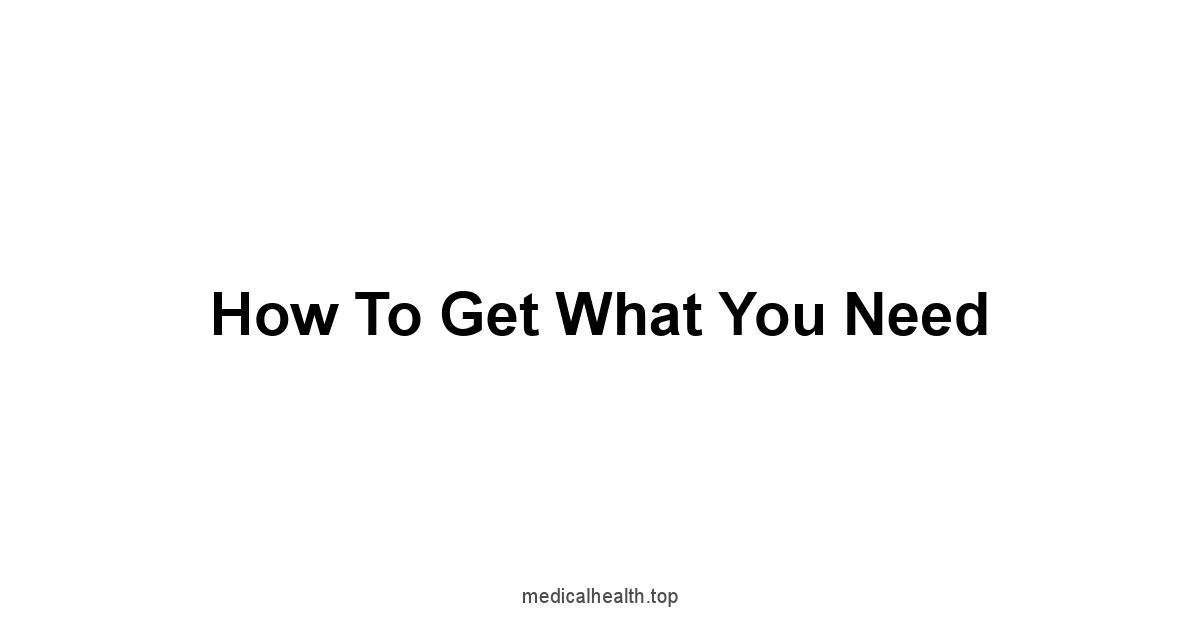
Getting the right amount of vitamins and minerals isn’t always easy.
It’s a lot more than just popping a daily multi-vitamin, it involves making smart choices about what you eat and how you live.
Food should be your primary source of nutrients, but sometimes, you might need a little extra help from fortified foods or supplements.
Understanding the best way to get these essential nutrients is key to staying healthy and well.
It’s not enough to just know what nutrients you need, you have to be proactive about how to get them.
A balanced diet is the first step, making sure to consume a variety of whole, unprocessed foods, that’s where you get the vast majority of what your body needs.
And it’s important to know when you might need a little extra and when you might be overdoing it.
Let’s dive into the best way to get these nutrients.
The Importance of a Balanced Diet
A balanced diet, it’s the cornerstone of good health.
It’s not about depriving yourself of the things you enjoy, it’s about making sure you’re getting all the nutrients your body needs in the right proportions.
It means eating a variety of foods from all the food groups: fruits, vegetables, whole grains, lean proteins, and healthy fats.
Think of your plate as a rainbow of colors, each color representing a different group of nutrients.
But a balanced diet is more than just eating different foods, it’s about finding the right balance.
It’s about getting enough of each nutrient, without overdoing it on others.
It’s about listening to your body and adjusting your diet as needed.
A balanced diet provides the foundation for overall well-being, the bedrock of good health, and is worth investing in.
- Key Components of a Balanced Diet:
- Variety of fruits and vegetables
- Whole grains
- Lean proteins
- Healthy fats
- Adequate hydration
- Benefits:
- Provides essential nutrients
- Maintains healthy weight
- Reduces risk of chronic diseases
- Boosts energy levels
- Improves mood
Whole Foods are King
Whole foods, they are the real deal.
They are the foods that are closest to their natural state, and they are packed with nutrients that your body loves.
Think of a freshly picked apple versus a highly processed snack bar.
The apple is full of vitamins, minerals, fiber, and antioxidants.
The snack bar is mostly sugar, unhealthy fats, and artificial ingredients.
Whole foods, such as fresh fruits, vegetables, whole grains, lean proteins, and healthy fats, they are the foundation of a healthy diet, they are where you get the majority of the nutrients your body needs.
These foods provide a wide range of nutrients working together in synergy. They are easy for the body to absorb and use.
It is essential to focus on whole foods to maximize your nutrient intake and overall health.
- Examples of Whole Foods:
- Fruits: Berries, apples, bananas, oranges
- Vegetables: Leafy greens, broccoli, carrots, peppers
- Whole Grains: Oats, quinoa, brown rice
- Lean Proteins: Chicken, fish, beans, lentils
- Healthy Fats: Nuts, seeds, avocados
- Rich in vitamins, minerals, and antioxidants
- High in fiber
- Low in processed ingredients
- Support overall health and well-being
Fortified Foods: When You Need a Boost
Fortified foods, they can be a helpful addition to your diet when you need an extra boost of certain nutrients.
These are foods that have had vitamins and minerals added to them during the manufacturing process.
They are a good way to address specific nutrient deficiencies, especially if you struggle to get enough through whole foods.
However, it’s important to remember that fortified foods should complement a healthy diet, not replace whole foods.
They can be helpful in certain situations, but they are not a substitute for a balanced diet rich in natural nutrients.
They are good to use in specific circumstances, but whole foods are always the first priority.
- Examples of Fortified Foods:
- Fortified milk with vitamin D
- Fortified cereals with iron and B vitamins
- Fortified plant-based milks with calcium and vitamin D
- When to Consider Fortified Foods:
- Addressing specific nutrient deficiencies
- Supplementing vegetarian or vegan diets
- Meeting increased nutrient needs during pregnancy or growth

Supplements: When to Consider Them
Supplements, they can be useful, but they aren’t a magic pill, it’s important to understand their place in a healthy diet.
They’re intended to supplement a balanced diet, not to replace whole foods.
In some situations, supplements can be necessary to correct deficiencies or meet certain nutrient needs.
However, it’s important to talk to a healthcare professional before starting to take any supplements.
It’s important to remember that supplements are not regulated like medications.
Be sure to choose high-quality products from reputable brands.
Supplements can be a useful tool when used correctly and when needed, but it’s always better to aim for a balanced diet, and supplements should be used with care.
- When to Consider Supplements:
- Addressing diagnosed nutrient deficiencies
- Meeting increased nutrient needs during pregnancy or lactation
- Supplementing a restricted diet e.g., vegan, vegetarian
- When advised by a healthcare professional
- Important Considerations:
- Consult with a doctor or registered dietitian before starting any supplement
- Choose high-quality supplements from reputable brands
- Follow dosage recommendations
- Remember that supplements should not replace whole foods
The Dangers of Overdoing It
Too much of a good thing, this is true with vitamins and minerals too.
While it is critical to get enough of these nutrients, it’s also important to be aware of the dangers of overdoing it.
Taking excessive amounts of certain vitamins and minerals can lead to adverse health effects, and can do more harm than good.
It is important to follow the recommended daily intakes for all nutrients, and to be cautious when taking supplements.
It’s possible to get too much of certain nutrients, especially fat-soluble vitamins like A, D, E, and K, which can build up in your body and cause toxicity.
It’s important to be careful with what you consume, and to always keep balance in mind.
- Risks of Overdoing It:
- Vitamin toxicity especially with fat-soluble vitamins
- Mineral imbalances
- Interference with medications
- Gastrointestinal issues
- Key Considerations:
- Follow recommended daily intake guidelines
- Be cautious with supplements
- Talk to a healthcare professional if you are unsure about nutrient intake
- Focus on whole foods to minimize risk of overdoing it
Decoding Deficiencies: What to Look For
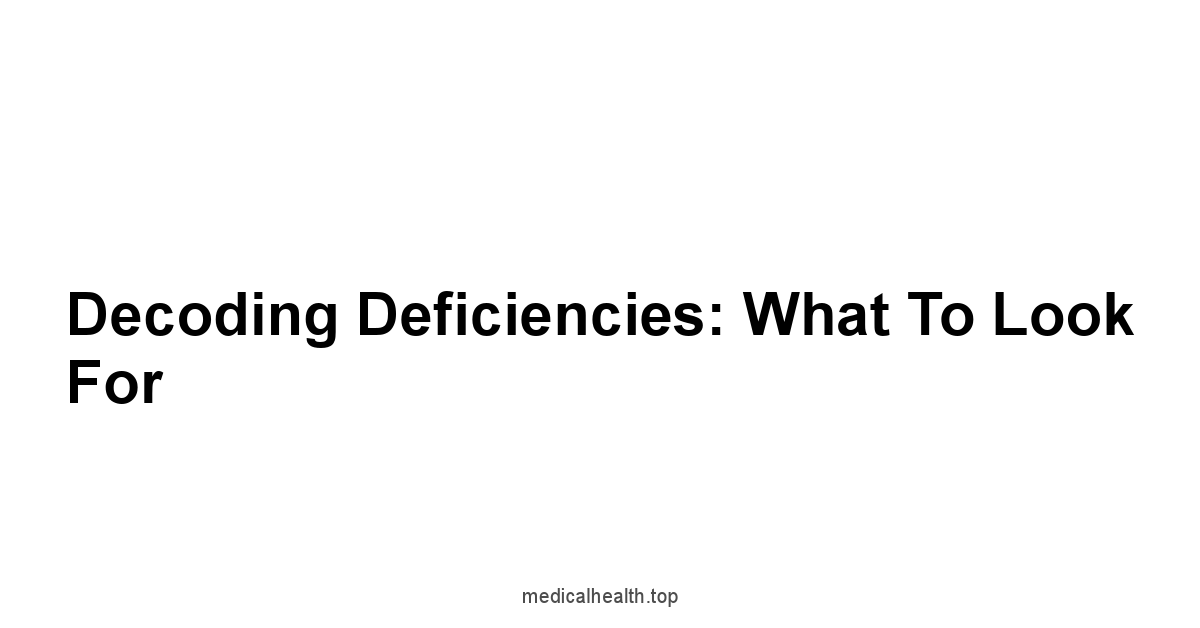
Nutrient deficiencies, they aren’t always easy to spot, and they can develop gradually over time.
It’s important to know the signs, and what to look for, because the sooner you identify a deficiency the quicker you can address it and avoid any long-term health problems.
Understanding these signs can help you take the right steps to improve your health and well-being.
It’s not always as obvious as a sudden illness, these deficiencies can manifest in subtle ways that you might easily dismiss.
It’s important to be aware of the common signs, both physical and mental. Being proactive and listening to your body are key.
If you suspect a deficiency, a medical professional can test and help you address the problem.
Let’s break down some common signs to look out for.
Signs of Vitamin Deficiencies
Vitamin deficiencies, they can show themselves in many different ways.
It’s important to be aware of the common signs and symptoms that might indicate a shortage of a certain vitamin.
Each vitamin has a unique role in the body, and a deficiency in each one can result in specific symptoms.
It’s crucial to pay attention to these signs to take the right steps to correct the problem.
It’s important to remember that these symptoms can also be indicative of other health conditions, so it’s always best to consult a healthcare professional for a proper diagnosis.
If you experience any of these signs, it’s a good idea to look into it, and take action to ensure you are getting all the vitamins you need to stay healthy.
- Common Vitamin Deficiency Signs:
- Vitamin A: Night blindness, dry skin, increased susceptibility to infections.
- B Vitamins: Fatigue, weakness, anemia, nerve damage, skin problems.
- Vitamin C: Scurvy, fatigue, poor wound healing, weak immunity.
- Vitamin D: Weak bones, muscle weakness, increased risk of infections.
- Vitamin E: Nerve damage, muscle weakness, impaired immunity.
- Vitamin K: Excessive bleeding, weak bones.
Signs of Mineral Deficiencies
Mineral deficiencies, just like vitamin deficiencies, can manifest in a variety of ways.
It is crucial to be aware of the signs and symptoms that could indicate a shortage of a certain mineral.
Each mineral has its own unique role in the body, and a deficiency in any one mineral can result in specific problems.
This is why paying attention to how you’re feeling is key to identifying potential deficiencies and addressing them.
These symptoms can also be a sign of other health issues, so it is important to consult with a healthcare professional for a proper diagnosis.
If you experience any of these signs, it is important to get it checked out and take action to ensure you are getting all the minerals you need to stay healthy and well.
- Common Mineral Deficiency Signs:
- Calcium: Weak bones, muscle cramps, osteoporosis.
- Iron: Fatigue, weakness, shortness of breath, anemia.
- Magnesium: Muscle cramps, fatigue, irregular heartbeat, high blood pressure.
- Potassium: Muscle weakness, fatigue, irregular heartbeat, high blood pressure.
- Zinc: Impaired immune function, poor wound healing, hair loss, loss of appetite.
- Iodine: Goiter, hypothyroidism, developmental problems.
Testing and Diagnosis: Talking to Your Doctor
Testing and diagnosis, this is crucial when you suspect a deficiency.
It’s always best to consult a healthcare professional for an accurate diagnosis and appropriate treatment plan.
They can use blood tests and other diagnostic methods to assess your nutrient levels and identify any deficiencies.
This is a much more accurate way of knowing if you are deficient in something rather than guessing on your own.
It’s important to be honest with your doctor about your dietary habits and symptoms so that they can have the most complete picture.
They can also give advice based on your particular situation.
A consultation with your doctor is always the best first step when you suspect a vitamin or mineral deficiency.
- Common Diagnostic Methods:
- Blood tests most common
- Urine tests
- Physical exam
- Evaluation of symptoms and medical history
- Why Consult a Doctor?
- Accurate diagnosis
- Personalized treatment plan
- Monitoring of treatment effectiveness
- Guidance on diet and supplements
- Rule out underlying medical conditions
Addressing Your Specific Needs
Addressing specific needs, this is important.
Everyone is different, and our needs for vitamins and minerals change over our lifetime.
Factors such as age, sex, activity level, diet, and overall health conditions can all influence your specific nutrient requirements.
What works for one person might not be enough for another, which is why individualizing your nutrient intake is vital.
It’s important to consider these factors when planning your diet and determining whether you need supplements.
Working with a healthcare professional or a registered dietitian can help you determine your specific needs and create a personalized plan to address them.
Understanding your specific needs is the first step in maintaining good health and well-being.
- Factors Influencing Nutrient Needs:
- Age: Infants, children, teenagers, adults, and seniors have different needs.
- Sex: Men and women have different nutrient requirements.
- Activity Level: Athletes and active individuals need more of certain nutrients.
- Diet: Dietary restrictions vegetarian, vegan may require careful planning to avoid deficiencies.
- Health Conditions: Certain medical conditions can affect nutrient absorption or increase nutrient needs.
- Personalized Approach:
- Consult with a healthcare professional
- Work with a registered dietitian
- Develop a personalized nutrition plan
- Regularly monitor your nutrient intake and health
Vitamins and Minerals Through Life Stages
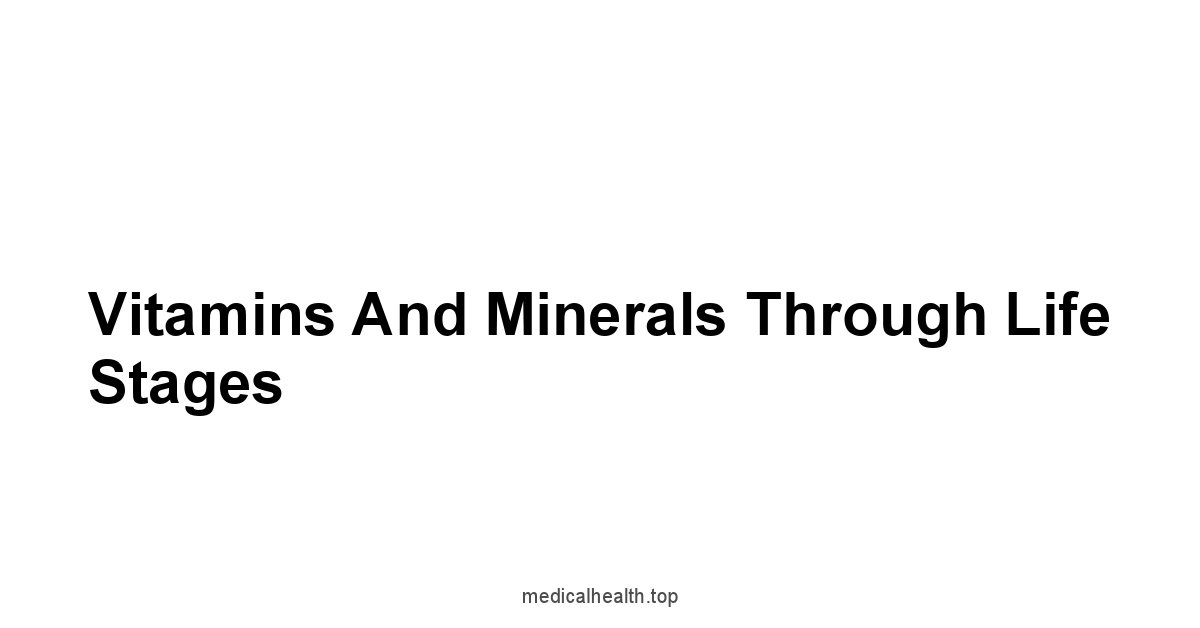
Vitamins and minerals, they are essential throughout all life stages, but our needs change as we grow and age.
From the rapid growth of infancy to the changes in adulthood and the unique challenges of aging, each life stage requires different amounts of certain nutrients.
Understanding these specific needs is critical for maintaining health and well-being.
It’s not just about getting enough of any vitamin or mineral, it’s about making sure you’re getting the right balance at each stage of life.
Children require more nutrients for growth and development, while older adults may need more nutrients to prevent age-related health problems.
Understanding these changes allows us to make informed decisions about our diets and health. Let’s take a look at the needs at each life stage.
Needs During Pregnancy
Pregnancy, it’s a unique time of life with unique nutritional needs.
The growing fetus requires a lot of nutrients for proper development, and the mother’s body needs extra support as well.
Getting enough vitamins and minerals during pregnancy is critical to ensure both the health of the mother and the baby.
Key nutrients such as folate, iron, calcium, and vitamin D become particularly important.
These nutrients play a crucial role in the baby’s growth, as well as maintaining the mother’s health throughout pregnancy.
It is essential for pregnant women to follow a balanced diet and to consult with a healthcare professional to ensure they are meeting all their nutritional needs. It’s an important time to get it right.
- Key Nutrients During Pregnancy:
- Folate B9: Essential for preventing neural tube defects
- Iron: Required for increased blood volume and fetal development
- Calcium: Important for the baby’s bone development
- Vitamin D: Needed for calcium absorption and immune function
- Iodine: Critical for fetal brain development
- Dietary Considerations:
- Eat a balanced diet with plenty of whole foods
- Increase intake of iron-rich foods
- Consume foods rich in folate
- Take prenatal vitamins as recommended by a healthcare professional
Childhood and Growth
Childhood, it’s a time of rapid growth and development.
Children require a variety of nutrients to support their growing bodies, their bones, and their brains.
The right vitamins and minerals are essential for building strong foundations for life.
It’s essential to get all the proper nutrients at this critical time.
Key nutrients such as calcium, vitamin D, iron, and zinc are particularly important during childhood.
These play crucial roles in bone development, immune function, and cognitive development.
It’s vital for children to eat a balanced diet and get enough of all these nutrients to ensure proper growth and development. It’s the foundation for a lifetime of health.
- Key Nutrients for Childhood Growth:
- Calcium: Essential for bone development and strength
- Vitamin D: Important for calcium absorption and bone health
- Iron: Required for healthy red blood cell production and brain development
- Zinc: Crucial for immune function and growth
- Vitamin A: Important for vision and cell growth
- Dietary Recommendations:
- Encourage a varied diet with plenty of whole foods
- Limit processed foods and sugary drinks
- Provide a balanced mix of fruits, vegetables, whole grains, and lean proteins
- Monitor nutrient intake to prevent deficiencies
Aging and Changing Requirements
Aging, it brings about a whole set of changes in our nutritional needs.
Older adults might have different needs than younger adults.
As we age, our bodies may absorb certain nutrients less effectively, and chronic conditions may increase our need for others.
It’s critical to be aware of these changing needs to support overall health in the later stages of life.
Key nutrients such as vitamin D, B12, calcium, and protein become particularly important for older adults.
These play crucial roles in maintaining bone health, cognitive function, and muscle mass.
It is important to have a balanced diet that is tailored to meet these changing requirements.
It’s about keeping your body and mind as healthy as possible through the later years.
- Key Nutrients for Aging:
- Vitamin D: Important for bone health and immune function
- Vitamin B12: Helps maintain nerve and red blood cell health
- Calcium: Essential for preventing bone loss and fractures
- Protein: Important for maintaining muscle mass and strength
- Omega-3 Fatty Acids: Beneficial for brain health
- Focus on nutrient-dense foods
- Consume adequate protein
- Ensure sufficient intake of vitamins and minerals
- Manage any chronic conditions that might affect nutritional needs
Considerations for Athletes and Active Individuals
Athletes and active people, they have unique nutritional needs.
Intense physical activity increases the demand for certain nutrients, particularly those involved in energy production and muscle repair.
Getting the right amount of vitamins and minerals is key to optimizing performance, and speeding up recovery.
Key nutrients such as B vitamins, iron, calcium, and magnesium are particularly important for athletes.
These nutrients play crucial roles in energy production, oxygen transport, bone health, and muscle function.
It is essential for athletes to follow a balanced diet that is tailored to meet the demands of their activity levels.
It’s important to support your body for the training and physical activity that you are doing.
- Key Nutrients for Athletes:
- B Vitamins: Involved in energy metabolism
- Iron: Essential for oxygen transport and preventing anemia
- Calcium: Important for bone health and preventing injuries
- Magnesium: Crucial for muscle function and preventing cramps
- Electrolytes: Help maintain hydration
- Consume a balanced diet with plenty of whole foods
- Ensure adequate carbohydrate intake to fuel workouts
- Eat sufficient protein to support muscle repair and growth
- Stay well-hydrated
- Monitor nutrient intake to avoid deficiencies
Maximizing Absorption: Tips and Tricks
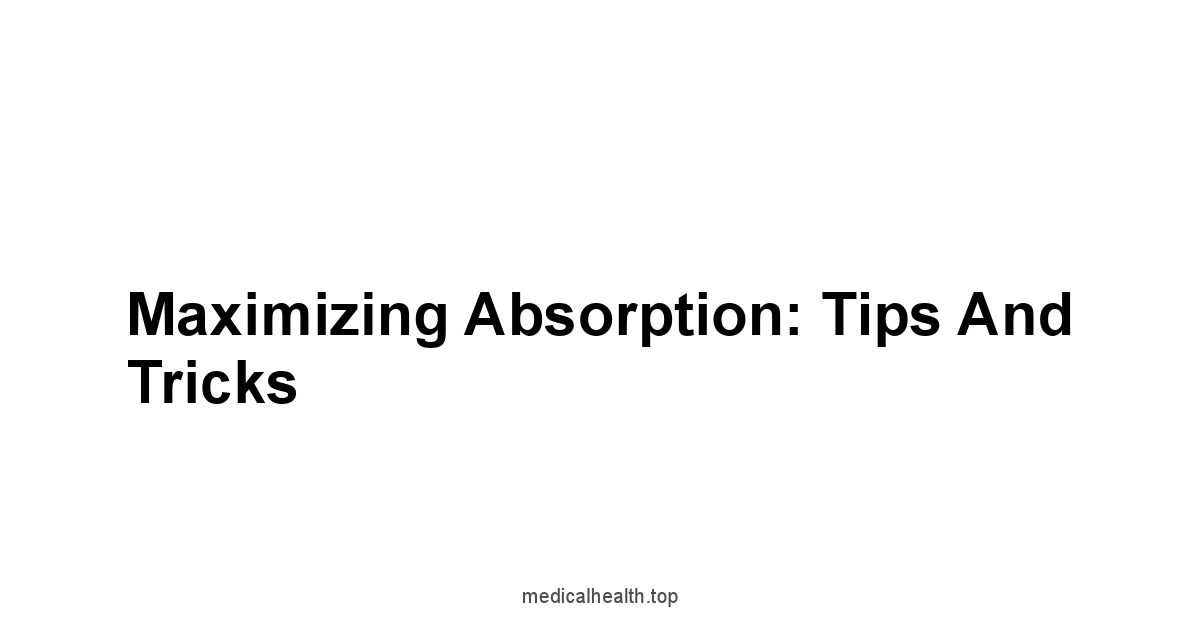
Getting the vitamins and minerals you need isn’t just about what you eat, but also about how your body absorbs those nutrients.
Certain factors can impact absorption, such as the presence of fats, food pairings, cooking methods, and gut health.
Understanding how to maximize absorption is key to getting the full benefit of the nutrients you consume.
It’s about more than just eating healthy, it’s about making sure your body can effectively use the nutrients you are taking in.
This involves understanding how to best combine your foods, prepare them correctly, and take care of your gut health.
Let’s take a look at these key elements and how they affect absorption.
The Role of Fat in Vitamin Absorption
Fat, it’s crucial for absorbing certain vitamins.
Not all vitamins are created equal, some are fat-soluble, meaning they need fat to be properly absorbed into the body.
These fat-soluble vitamins, A, D, E, and K, are best absorbed when eaten with foods that contain healthy fats. This is essential for your body to use them.
Without sufficient fat in your diet, your body can’t absorb these vitamins effectively, no matter how much of them you eat.
It’s not about eating a lot of unhealthy fats, but about including healthy fat sources in your diet.
Including foods like avocados, nuts, seeds, and olive oil in your diet is essential to help your body absorb these vital nutrients.
- Fat-Soluble Vitamins:
- Vitamin A
- Vitamin D
- Vitamin E
- Vitamin K
- How Fat Aids Absorption:
- Fat helps transport fat-soluble vitamins across the intestinal wall into the bloodstream
- Fat provides the necessary environment for these vitamins to be dissolved and absorbed
- Tips for Including Healthy Fats:
- Add avocados to salads or sandwiches
- Use olive oil for cooking
- Snack on nuts and seeds
- Include fatty fish salmon, tuna in your diet
Food Pairings That Help
Food pairings, they can also impact how your body absorbs nutrients.
Combining certain foods can enhance or hinder the absorption of vitamins and minerals.
Knowing the right combinations can help you get the most out of your meals and improve the efficiency of nutrient absorption.
It’s like creating a winning recipe for absorption.
For instance, pairing iron-rich foods with vitamin C can significantly boost iron absorption.
Conversely, certain substances in food can inhibit absorption.
Pairing your foods correctly is a small adjustment that can have a big impact on your nutrient intake.
It’s about more than just what you eat, but how you eat it.
- Beneficial Food Pairings:
- Iron + Vitamin C: Vitamin C enhances iron absorption e.g., spinach with lemon juice
- Calcium + Vitamin D: Vitamin D helps calcium absorption e.g., dairy products with fortified foods
- Turmeric + Black Pepper: Black pepper enhances absorption of curcumin e.g., add black pepper to your curries
- Food Pairings to Avoid:
- Calcium and Iron: Calcium can inhibit iron absorption e.g., avoid taking calcium supplements with iron-rich meals
- Phytates and Minerals: Phytates in legumes and grains can reduce mineral absorption e.g., soak beans and grains to reduce phytates
- Strategies for Better Absorption:
- Combine nutrient-rich foods wisely
- Plan your meals to maximize absorption
- Soak or sprout grains and legumes
Cooking Methods Matter
Cooking methods, they can also affect the nutrient content of your food.
How you prepare your food can either enhance or diminish the amount of vitamins and minerals that your body can absorb.
The goal is to preserve as many nutrients as possible during the cooking process, and understanding the best practices is key to maximizing nutrient retention.
Some cooking methods, like boiling, can leach water-soluble vitamins into the water.
While other methods, like steaming or stir-frying, can help retain more of the nutrients.
It is important to choose your cooking methods wisely to ensure you get all the
Final Thoughts
Vitamins and minerals, they aren’t just fancy words on a label.
They’re the tiny gears and crucial building blocks that keep your body running.
We’ve broken down their roles, what they do, and how to get them, and we know that they’re not just about avoiding sickness, they’re about powering your life, keeping you sharp, and making sure everything works as it should.
These are the essentials, the things you need to take care of so you can do everything you want to do.
Now, it’s not enough to just know about all this, you have to put it into practice.
You’ve got to think about what you’re eating, and how you’re treating your body.
It’s about making smart choices when you’re at the grocery store, and thinking about what you’re putting into your body.
You can’t rely on a pill or a supplement to do all the work, you’ve got to focus on real food.
It’s about making small changes each day, and taking responsibility for your health.
A balanced diet is the best place to start, and it’s also about making sure you are not overdoing it and understanding that your needs will change throughout your life.
Remember what we discussed about overdoing it and the negative effects it can bring.
Look at the signs, pay attention, it is always important to know the signals your body sends.
Are you tired? Are your muscles weak? These could be signs of something more.
When you feel like something is off, listen to it and act.
If you think there may be a deficiency, don’t guess, go see a doctor. It’s the smart thing to do.
They can test you, and make sure you’re getting what you need.
Don’t neglect your health, it’s the most important thing you have.
In the end, vitamins and minerals are the foundation of your health, and they should be part of a bigger picture of self-care. It’s not about perfection, it’s about progress.
It’s about making those small choices every day that add up to a big difference.
This information should help you make better and smarter choices, and it’s a step towards a stronger, healthier, and better you. Take care of yourself, and keep moving forward.
Frequently Asked Questions
What are vitamins and why do I need them?
Vitamins, they’re not the main fuel like protein or carbs, but they’re essential.
Think of them as the small gears that keep the body working right.
We can’t make most of them, so we need to get them from food.
They handle everything from your eyesight to your immunity. They’re vital for how you function.
What does Vitamin A do for me?
Vitamin A is key for good vision, especially at night.
It keeps your eyes healthy and helps with overall cell growth.
It keeps your skin healthy and your immune system strong. It’s a key player in keeping you healthy.
Why are B vitamins so important?
The B vitamins, it’s a whole team, and they keep your engine running. They help convert food into energy.
Each has a specific job, like nerve function and forming red blood cells. They are vital for your overall health.
How does Vitamin C help?
Vitamin C is known as the immune booster.
It’s a strong antioxidant, and it helps create collagen for skin, bones, and blood vessels.
It’s also a key player in healing wounds, your body doesn’t store it, so you need to keep eating it.
Why is Vitamin D called the “sunshine vitamin”?
Vitamin D, your body can make it when you’re in the sun.
It helps you absorb calcium, keeping your bones strong.
It also plays a role in your immune system and muscle function.
It’s a multitasker, and it’s important to get enough of it.
What does Vitamin E do for the body?
Vitamin E, it’s another antioxidant. It protects your cells from damage.
It also supports your immune system, your skin, and your eyes. It’s like a shield against disease.
What role does Vitamin K play?
Vitamin K is vital for blood clotting.
It also helps with bone health, making sure calcium goes where it needs to go. It’s crucial for keeping your blood healthy.
What are minerals and why are they important?
Minerals, they are the raw materials for your body. They make up your bones, teeth, and tissues.
They help your muscles, nerves, and heart, like the building blocks and conductors.
Why is calcium so important?
Calcium, it’s the main mineral in your bones and teeth. It keeps them strong.
It’s also key for muscle function, nerve signals, and blood clotting. If you don’t get enough, your bones can get weak.
What role does iron play in my body?
Iron, it’s the oxygen carrier in your blood.
It’s in hemoglobin, which carries oxygen through your body. Without it, you get tired and weak.
It’s also important for energy and brain development.
What are the benefits of magnesium?
Magnesium, it is involved in lots of chemical reactions.
It keeps your muscles working, calms them and prevents cramps.
It helps with nerves, blood sugar, and blood pressure. It’s important for your overall health.
Why do I need potassium?
Potassium, it helps keep your fluid levels right. It works with sodium.
It’s also important for nerves and muscle contractions.
It’s key for your whole body to function correctly.
What does zinc do for the body?
Zinc, it’s key for your immune system. It helps fight infections.
It’s also important for wound healing, cell growth, and even your sense of taste and smell. It supports many functions of the body.
Why is iodine so important for my health?
Iodine, it’s essential for your thyroid.
The thyroid makes hormones that control metabolism, growth, and development. It’s important for your body to work properly.
How can I make sure I’m getting enough vitamins and minerals?
A balanced diet, it’s the cornerstone.
Eat whole foods, like fruits, vegetables, whole grains, lean proteins, and healthy fats.
They are the best source of these nutrients, you can use fortified foods and supplements, when needed.
What are whole foods and why are they better?
Whole foods, they are closest to their natural state. They are packed with nutrients.
Think of a fresh apple, compared to a processed snack bar. Whole foods are the foundation of a healthy diet.
What are fortified foods?
Fortified foods, they’ve had vitamins and minerals added during production.
They can help when you need a boost of certain nutrients.
They complement a healthy diet, but they aren’t a replacement for whole foods.
When should I consider taking supplements?
Supplements, they can be useful, but they’re not magic.
They can help with deficiencies or when you need a specific nutrient boost.
Always talk to a doctor before starting any supplement. It’s important to use them wisely.
Is it possible to have too much of a vitamin or mineral?
Yes, you can have too much. It is important to follow the recommended amounts.
Too much of certain vitamins and minerals, especially fat-soluble ones, can cause problems. It’s about finding balance and being careful.
What are some signs of vitamin deficiencies?
Vitamin deficiencies, they show up in different ways.
Vitamin A issues might cause vision problems, and B vitamin issues can cause fatigue.
Other issues include poor wound healing, or weak bones, depending on the vitamin. If you have any of those, see a doctor.
What are some signs of mineral deficiencies?
Mineral deficiencies, they have their own signs.
Low calcium can cause weak bones, low iron can cause fatigue.
Deficiencies in other minerals like magnesium or potassium can lead to cramps and other health issues.
See a doctor if you think you might have a deficiency.
How do I know if I have a deficiency?
If you think you might have a deficiency, see a doctor.
They can run tests to find out what you might be lacking.
They can also help you create a treatment plan to address your needs.
Do my nutrient needs change throughout my life?
Yes, they do.
Your needs for vitamins and minerals change as you grow and age.
Kids need more nutrients for development, while older adults may need more to prevent health problems.
It is important to understand your needs at each stage of your life.
What are the key nutrients for pregnancy?
Pregnancy, it’s a special time.
Folate, iron, calcium, and vitamin D become important.
They are all vital for the baby’s growth and the mother’s health. It’s important to get it right during this time.
What are important nutrients for kids?
Kids, they need vitamins and minerals to grow strong.
Calcium, vitamin D, iron, and zinc are important for bones, immunity, and brain development. It’s key to have a balanced diet from a young age.
How do nutrient needs change as you get older?
As you get older, your body may not absorb nutrients as well.
You might need more of certain nutrients like vitamin D, B12, calcium, and protein to maintain your health.
It’s important to adjust as needed to keep healthy and strong.
What about athletes? What nutrients do they need?
Athletes, they have unique needs.
They need more B vitamins, iron, calcium, and magnesium to support energy, oxygen transport, and muscle function.
A diet tailored to their activity level is important.
How does fat help with vitamin absorption?
Fat, it’s key for absorbing fat-soluble vitamins.
Vitamins A, D, E, and K need fat to be absorbed by your body.
Eating healthy fats, such as avocados, and nuts, with those vitamins, helps your body use them.
Are there any food pairings that help with absorption?
Yes, certain pairings can help.
Eating iron-rich foods with vitamin C boosts iron absorption.
Combining calcium with vitamin D can also help your body absorb more calcium.
Proper food pairing is a good way to get the most from your meals.
Do cooking methods affect nutrients?
Yes, cooking methods matter.
Some methods, like boiling, can leach out water-soluble vitamins.
Steaming and stir-frying can help keep more nutrients in your food. Choosing the right cooking method is vital.
